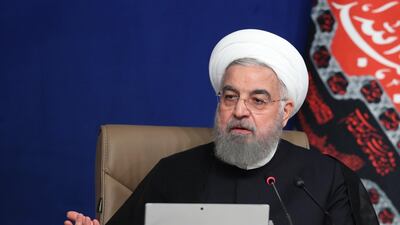On Friday, the International Atomic Energy Agency (IAEA), a UN body, reported that Iran's stock of enriched uranium has reached 2,105 kilograms. This is a figure 10 times higher than what it agreed to under a 2015 agreement – the Joint Comprehensive Plan of Action (JCPOA). The US and Iran both withdrew from the agreement, in 2018 and 2020, respectively.
The IAEA warned that Iran is also exceeding the permitted level of enrichment, which determines whether uranium is suitable for use in civilian nuclear energy or, at if it is high enough, as a critical component of a nuclear bomb. Limiting the proliferation of uranium and the capability to enrich it to weapons grade is fundamental to minimising the threat of global nuclear war. It is also part of the raison d'etre of the IAEA.
In matters of non-proliferation, however, Iran has long been opaque. For months, authorities in Tehran declined to allow access for the IAEA, which acts as the world's nuclear watchdog, to two Iranian nuclear centres for inspections. Even without access to these facilities, the agency had already surmised that Iran had committed a string of JCPOA violations.
Late last month, in an effort to boost its diplomatic standing, Iran relented. Inspectors attended to the first of the two facilities last week. Friday's report was released after that visit.
While American officials have repeatedly invited Iran to renegotiate the terms of the JCPOA, Tehran has refused to participate in any talks, demanding the US lifts sanctions it has imposed. In response to these sanctions and other elements of the US's maximum-pressure campaign, Iran has systematically reduced its compliance with the JCPOA. Since it announced its intention to scale up its enrichment dramatically back in January, Iran has been openly in defiance of its international obligations.
On October 18, a UN conventional arms embargo on Iran is set to expire, and the US has pursued, complicated procedural avenues within the Security Council to activate a "snapback", in which the embargo would be renewed and the JCPOA would, in effect, be terminated. The UK and France – normally US allies – have pushed back at the American efforts in a bid to keep the JCPOA alive.
The key point of contention within the Security Council over the last month has been whether or not the US – now that it has exited the agreement – still has any right to trigger a snapback. The US and Iran have each submitted opposing legal arguments on this and other questions, and the outcome remains uncertain.
Regardless of whether or not the snapback is imposed, however, the accelerated transformation of Iran's "reduced compliance" into outright noncompliance ought to be alarming. For one thing, it provides Iran greater influence in any future negotiation – a fact that, to some extent, can motivate Tehran's strategy. For another, it diminishes the force of future agreements by showing Iran's government that it can engage in noncompliance without serious consequences.
Iran has withstood US sanctions, which have taken a toll on its economy, for years by largely relying on its regional proxies. But the headwinds that rock Iran’s establishment are particularly strong now. The pandemic has worsened existing disillusionment, in Iran and elsewhere in the region, with Tehran and its militias in other states. If European countries do not wish to support the US’s maximum-pressure campaign, whatever solution arrives must emphasise to the Iranians that destabilising moves and the defiance of international law will get them nowhere.


